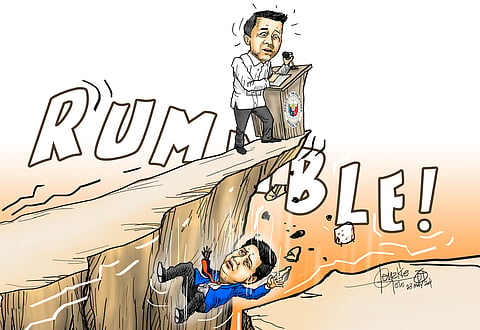
- NEWS
- the EDIT
- COMMENTARY
- BUSINESS
- LIFE
- SHOW
- ACTION
- GLOBAL GOALS
- SNAPS
- DYARYO TIRADA
- MORE

In the ever-volatile landscape of Philippine politics, leadership changes often come with a mix of intrigue, speculation, and a touch of drama. The recent shift in the Senate leadership was no exception, with Senator Chiz Escudero taking the helm from Senator Migz Zubiri, amid a backdrop of controversy and finger-pointing.
The ousted Senate President pointed to the alleged leaks from the Philippine Drug Enforcement Agency (PDEA) as the catalyst for his downfall, painting a picture of political machinations and backdoor dealings that have come to define the legislative body.
Escudero’s ascension to the Senate presidency marks a significant shift in the upper chamber’s power dynamics. Known for his eloquence and sharp political acumen, Escudero has long been a prominent figure in Philippine politics. His leadership style, characterized by a balance of pragmatism and populism, suggests a new direction for the Senate — one that could potentially foster more robust debate and legislative action.
However, the transition has not been without controversy. Zubiri’s tenure as Senate President was abruptly cut short, leading to widespread speculation about the underlying reasons.
There were insinuations that one of the reasons for the revamp was the Senate’s investigation into the leaked PDEA document linking President Marcos to illegal drugs.
These claims have added a layer of complexity to an already fraught political environment, raising questions about the integrity of the processes and the true motivations behind the leadership change.
Zubiri’s allegations suggest that these leaks were strategically timed to undermine his leadership, possibly orchestrated by factions within or outside the Senate with vested interests in seeing him deposed.
This scenario underscores the often cut-throat nature of Philippine politics, where alliances are fluid, and the quest for power can lead to ruthless tactics.
For his part, Escudero has distanced himself from the controversy, focusing instead on his vision for the Senate under his leadership. In his inaugural address, Escudero emphasized the need for unity and collaborative governance.
He called for a renewed commitment to public service, highlighting key legislative priorities such as economic recovery, social welfare and national security.
Escudero’s rhetoric suggests a desire to move past the controversies that have plagued the Senate, aiming to restore its reputation as a bastion of democracy and a platform for meaningful policy debates.
The transition in the Senate leadership also brings to light the broader issue of political stability in the Philippines. Leadership changes are not uncommon, but how they occur can either strengthen or weaken democratic institutions.
A leadership change marred by allegations of subterfuge and betrayal, as in the case of Zubiri’s ousting, risks creating a climate of suspicion and divisiveness. It highlights the need for transparency and accountability within the political system to ensure that leadership transitions are conducted fairly and with integrity.
As the new Senate President, Escudero faces the daunting task of navigating these turbulent waters. His ability to unify the Senate and address the pressing issues facing the nation will be crucial in determining the success of his tenure. Escudero’s track record as a skilled legislator and his reputation for being a consensus-builder will be put to the test as he seeks to steer the Senate through this period of uncertainty.
For a country striving to maintain its democratic ideals amidst various challenges, the integrity of its legislative processes is paramount. Ensuring that leadership changes are free of undue influence and conducted transparently is essential to upholding the credibility of its democratic institutions.
While Escudero’s ascension offers potential for renewed focus and legislative vigor, the circumstances surrounding Zubiri’s ousting raise critical questions about the influence of external forces and the integrity of political processes.
As the Senate moves forward under Escudero’s leadership, the challenge will be to restore public confidence, promote transparency, and ensure that the legislative body remains a pillar of democracy dedicated to serving the interests of the Filipino people.
